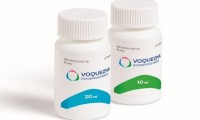-
Moderna Posts Q3 Loss, Takes $1.3B in Write-Downs on COVID-19 Shots
- Source: drugdu
- 158
- November 4, 2023
-
Alliance for mRNA Medicines launched to accelerate global innovation
- Source: drugdu
- 97
- November 4, 2023
-
Merck’s Keytruda combination granted FDA approval for biliary tract cancer
- Source: drugdu
- 94
- November 4, 2023
-
Phathom passes acid tests, capturing 2 FDA approvals for Voquezna after impurity setback
- Source: drugdu
- 97
- November 4, 2023
-
Sarepta enjoys early sales ramp for DMD gene therapy, maintains confidence in label expansion
- Source: drugdu
- 96
- November 4, 2023
-
FDA warning letter accuses Wavi of selling unapproved neurological device
- Source: drugdu
- 216
- November 3, 2023
-
$13M NIH grant funds research to rejuvenate immune system in older adults
- Source: drugdu
- 107
- November 3, 2023
-
More Than 60 Groups Ask Senate Leadership To Pass Legislation To Lower Drug Prices
- Source: drugdu
- 97
- November 3, 2023
-
FDA Grants Fast Track Designation to Sellas Life Sciences’ SLS009 for Lymphoma
- Source: drugdu
- 104
- November 3, 2023
-
Amgen scores FDA approval for Stelara biosimilar
- Source: drugdu
- 95
- November 3, 2023
your submission has already been received.
OK
Subscribe
Please enter a valid Email address!
Submit
The most relevant industry news & insight will be sent to you every two weeks.













